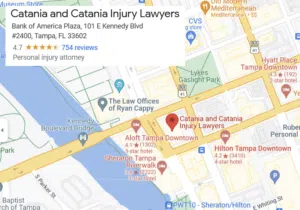
Car seat laws are designed to keep children safe and prevent or minimize the injuries they might sustain in a car accident. Following the law protects your children – and also your right to recover compensation if you happened to be involved in a wreck. So, it’s extremely important to understand Florida’s child car seat laws when driving with young children.
Here’s what you need to know about car seat laws in Florida.
Table of Contents
Florida Statutes Section 316.613 – Child Restraint Requirements
Florida has an official statute regarding child car seats: Florida Statutes Section 316.613.
Under the law, the following requirements apply:
- All children five years of age or younger must be protected in a moving motor vehicle with a “crash-tested, federally approved child restraint device.”
- The restraint device for children three years of age and younger “must be a separate carrier or a vehicle manufacturer’s integrated child seat.”
- Children four or five years of age may be protected with a separate carrier, integrated seat, or booster seat.

There are rare exceptions to these requirements when a child has a medical condition that can prevent them from comfortably or safely being restrained. However, you need to acquire documentation from a medical professional officially stating your child’s condition qualifies your exemption from the standard legal requirements.
It’s also important to understand that the law generally applies only to the “parent, guardian, or other person responsible for a child’s welfare” in most circumstances. For example, if you’re taking your child with you in a taxi or limo, the driver is not responsible for providing your child with the necessary restraints. That’s your responsibility.
What Are the Weaknesses of Florida’s Child Car Seat Laws?
Florida’s child car seat law is strict for good reason. However, it isn’t perfect.
For example, it doesn’t describe in precise detail what constitutes a “child restraint system.” It also doesn’t list any height or weight requirements. This can result in understandable confusion among parents when deciding how to keep their children safe in the car.
Florida’s law also only addresses how you must restrain a child to avoid legal trouble. It doesn’t go into further detail regarding how parents can enhance their children’s safety to an even greater degree in the car.
You may want to take additional steps to protect your child, such as researching national guidelines explaining when a child should be in a rear-facing seat and when they should be in a front-facing seat.
Comparative Fault Rules Don’t Apply If You Violate Car Safety Laws
In Florida, sharing blame for an accident doesn’t bar a financial recovery for things like medical bills or lost wages. However, under the state’s comparative negligence. rule, the amount of money that you ultimately collect could be reduced if it can be shown that you are partially responsible for causing your own injuries.
For example, maybe someone struck your vehicle while you were driving over the speed limit. It might be thus determined that you are 20% responsible for your injuries, as they may have been less severe or entirely avoided had you not been speeding.
This could impact how much you could recover in damages. In this example, if you would have otherwise had the chance to recover up to $100,000, the most you could now recover would be $80,000.
Now, perhaps your child was injured in an accident that occurred while you were driving and you’re seeking compensation on their behalf. You might wonder whether an at-fault party or their insurer can avoid paying you all you deserve by arguing you were in violation of Florida’s child car seat laws when the accident occurred.
Luckily, they cannot. Florida law doesn’t permit this defense. Your children will be entitled to all of the compensation they need to recover from their injuries.
What Happens If I’m In an Accident and the Car Seat is Defective?
Although this doesn’t necessarily relate directly to Florida’s child car seat laws, it’s worth noting that sometimes children are harmed because their car seats or restraints are defective. If this were to happen to your child, you might be able to recover compensation by filing a claim against the company that designed, manufactured, or sold the car seat.
Under the state’s product liability laws, companies can be strictly liable for injuries related to products that are defective or unreasonably dangerous. That means you’d just have to prove that your child suffered injuries because of a design defect or manufacturing defect, or because of a potential hazard that the company failed to disclose to you. Airbag injuries and seatbelt injuries after a car accident are other common product liability claims.
This is one of many reasons it’s important to coordinate with experts when seeking compensation after an accident. Our team of Tampa product liability lawyers has the expertise and resources necessary to gather evidence showing a designer or manufacturer negligently overlooked a defect.
Contact Our Car Accident Law Firm in Tampa, FL
According to the latest auto accident statistics, car accidents are on the rise in the Tampa Bay area. It’s crucial to keep your kids safe by following Florida’s car seat laws. They’re designed to protect your kids and mitigate any injuries they might suffer in a crash. If you are involved in a crash, it’s important to seek guidance and help from an experienced Tampa car accident lawyer. Our law firm handles all types of car accident cases including:
- Distracted driving,
- Drunk driving,
- Head-on crashes,
- Hit-and-run,
- Left Turn accidents,
- Recreational vehicle accidents,
- Red and yellow light accidents,
- Rollover accidents,
- Speeding,
- And more.
Call Catania & Catania Injury Lawyers at (813) 222-8656 or contact our Tampa law offices online to find out how we can help your family seek just compensation from those responsible. Your first case evaluation is free.




